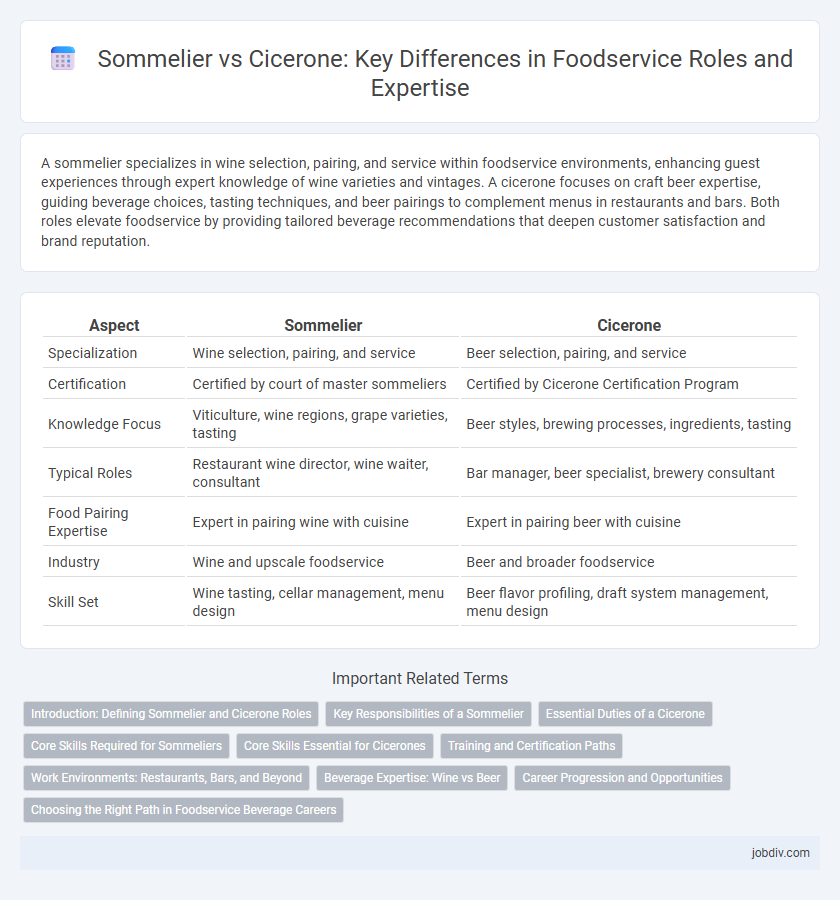A sommelier specializes in wine selection, pairing, and service within foodservice environments, enhancing guest experiences through expert knowledge of wine varieties and vintages. A cicerone focuses on craft beer expertise, guiding beverage choices, tasting techniques, and beer pairings to complement menus in restaurants and bars. Both roles elevate foodservice by providing tailored beverage recommendations that deepen customer satisfaction and brand reputation.
Table of Comparison
| Aspect | Sommelier | Cicerone |
|---|---|---|
| Specialization | Wine selection, pairing, and service | Beer selection, pairing, and service |
| Certification | Certified by court of master sommeliers | Certified by Cicerone Certification Program |
| Knowledge Focus | Viticulture, wine regions, grape varieties, tasting | Beer styles, brewing processes, ingredients, tasting |
| Typical Roles | Restaurant wine director, wine waiter, consultant | Bar manager, beer specialist, brewery consultant |
| Food Pairing Expertise | Expert in pairing wine with cuisine | Expert in pairing beer with cuisine |
| Industry | Wine and upscale foodservice | Beer and broader foodservice |
| Skill Set | Wine tasting, cellar management, menu design | Beer flavor profiling, draft system management, menu design |
Introduction: Defining Sommelier and Cicerone Roles
Sommelier and Cicerone are specialized professionals in the foodservice industry, each focusing on beverage expertise to enhance customer experience. A Sommelier primarily experts in wine selection, pairing, and service within restaurants and fine dining establishments. In contrast, a Cicerone specializes in beer knowledge, including styles, tasting, and appropriate food pairings, contributing to craft beer education and service.
Key Responsibilities of a Sommelier
A Sommelier specializes in wine selection, pairing, and service, ensuring guests receive the ideal wine experience that complements their meal. Key responsibilities include curating wine lists, managing cellar inventory, training staff on wine knowledge, and advising customers on wine pairings. Their expertise enhances the overall dining experience by aligning beverage choices with the restaurant's cuisine and ambiance.
Essential Duties of a Cicerone
A Cicerone's essential duties include expertly selecting, storing, and serving craft beers while ensuring optimal freshness and flavor profiles. They educate staff and customers on beer styles, pairing techniques, and proper tasting methods to enhance the dining experience. Maintaining quality control throughout the beer lifecycle and managing inventory are critical responsibilities unique to the Cicerone role in foodservice.
Core Skills Required for Sommeliers
Sommeliers require deep expertise in wine varieties, tasting techniques, and food pairings to enhance the dining experience. Their core skills include sensory evaluation, wine service, and extensive knowledge of wine regions and vintages. Mastery of customer communication and inventory management also distinguishes sommeliers in fine dining establishments.
Core Skills Essential for Cicerones
Cicerones possess specialized knowledge in beer styles, brewing processes, and flavor profiles, enabling precise beer and food pairings that enhance the dining experience. Core skills include advanced sensory evaluation, understanding beer microbiology, and mastering proper serving techniques to maintain beverage quality. These competencies ensure cicerones can guide customers in selecting and appreciating craft beers, distinguishing them from sommeliers who specialize in wine.
Training and Certification Paths
Sommelier training emphasizes wine knowledge, tasting skills, and pairing techniques, typically certified through programs like the Court of Master Sommeliers or the Wine & Spirit Education Trust (WSET). Cicerone certification focuses on beer styles, brewing processes, and service, with levels including Certified Beer Server and Advanced Cicerone awarded by the Cicerone Certification Program. Both paths require practical experience and exams, but sommeliers concentrate on wine expertise while cicerones specialize in beer mastery for foodservice professionals.
Work Environments: Restaurants, Bars, and Beyond
Sommeliers primarily work in restaurants, specializing in wine selection, pairing, and service to enhance the dining experience. Cicerones operate mainly in bars, breweries, and craft beer establishments, focusing on beer quality, flavor profiles, and proper serving techniques. Both roles expand beyond traditional venues, including hotels, event catering, and beverage consulting, reflecting the growing demand for expert beverage knowledge across foodservice environments.
Beverage Expertise: Wine vs Beer
Sommelier expertise centers on wine knowledge, including grape varieties, terroir, vintages, and proper wine pairing techniques with food. Cicerone certification emphasizes deep understanding of beer styles, brewing processes, ingredients, and ideal serving methods to enhance the dining experience. Both roles require sensory evaluation skills but specialize distinctly in wine or beer to elevate beverage service in foodservice establishments.
Career Progression and Opportunities
Sommelier and Cicerone certifications offer distinct career progression paths within the foodservice industry, with sommeliers specializing in wine service and beverage program management primarily in fine dining restaurants, while cicerones focus on beer expertise and quality control often in breweries, pubs, and hospitality venues. Achieving advanced certification, such as Master Sommelier or Certified Cicerone, significantly enhances job prospects, salary potential, and industry recognition. Both career tracks provide opportunities for consulting, education, and leadership roles, with sommeliers tending toward upscale culinary environments and cicerones expanding into craft beer markets and brewpub management.
Choosing the Right Path in Foodservice Beverage Careers
Sommelier and Cicerone certifications both elevate beverage expertise but focus on different categories, with sommeliers specializing in wine and cicerones mastering craft beer. Choosing the right career path depends on your passion for either wine or beer, as well as the specific demands of restaurants, wineries, breweries, and hospitality venues. Expertise in sensory evaluation, beverage pairing, and inventory management are critical skills across both paths, influencing job opportunities and salary potential in the competitive foodservice industry.
Sommelier vs Cicerone Infographic

 jobdiv.com
jobdiv.com